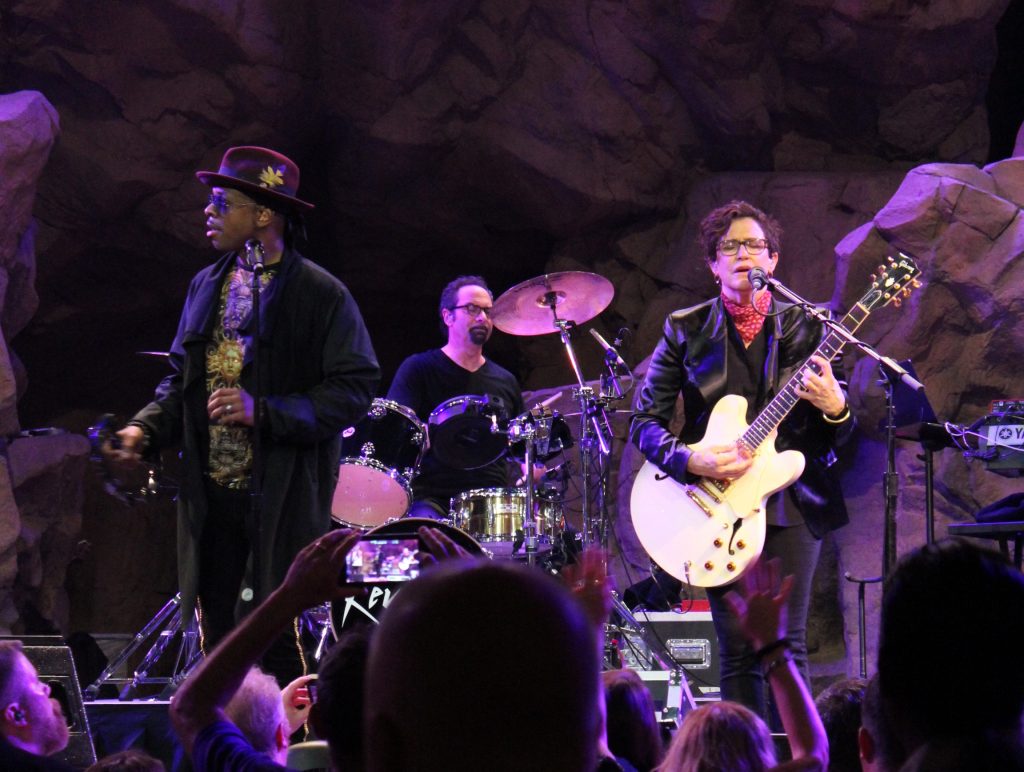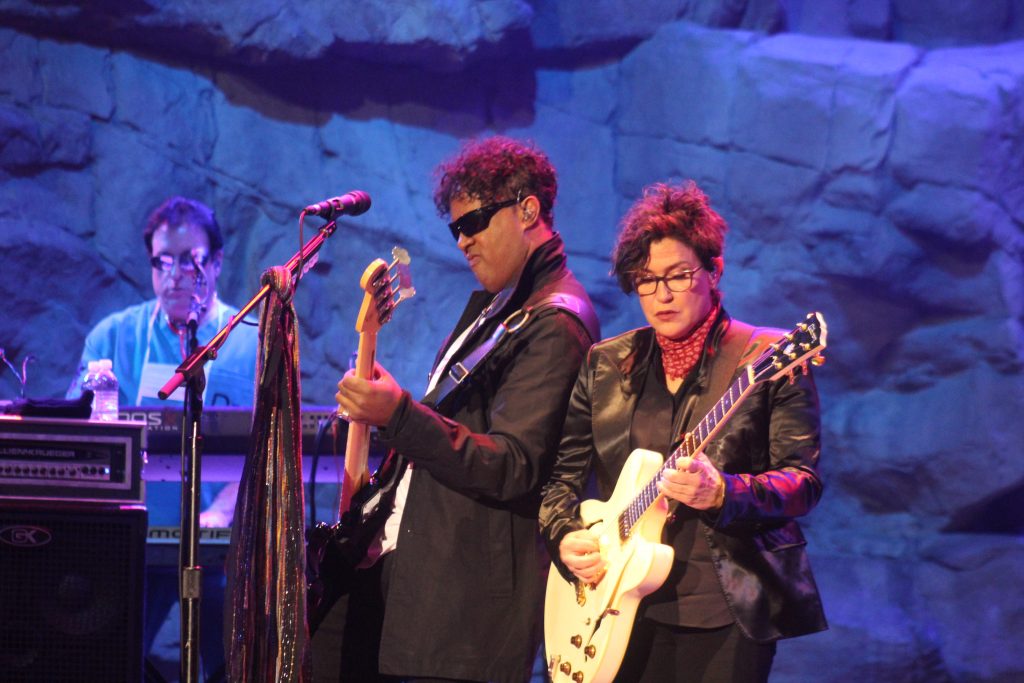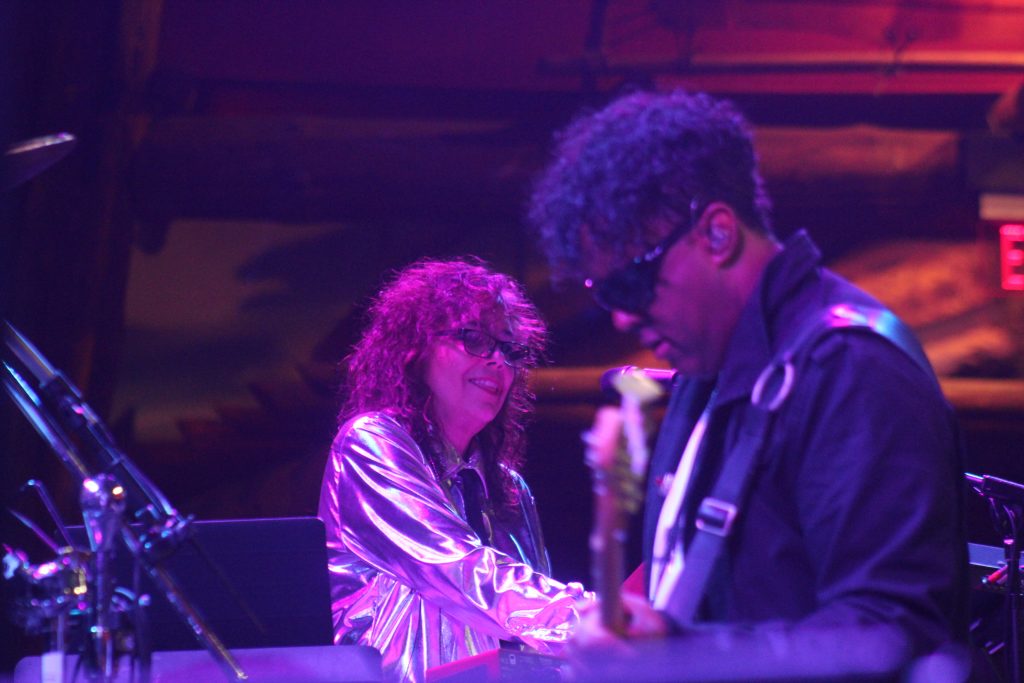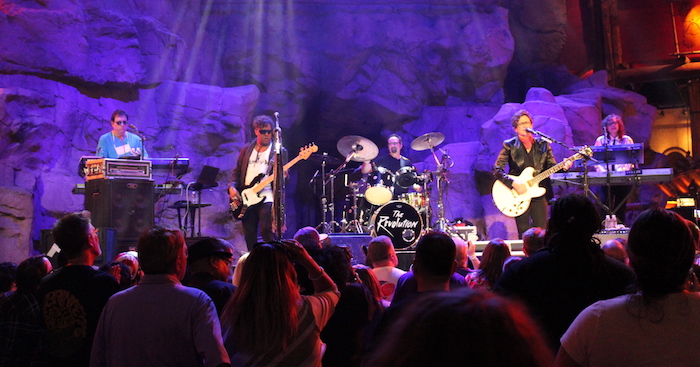
Prince’s sudden passing in April 2016 created numerous voids in the music world, not least among them the loss of one of the era’s most remarkable stage performers. When the classic lineup of The Revolution, the band on his most storied albums, reunited last September for a three-show stand in Minneapolis three decades after its last tour together, it couldn’t replace what was missing, but offered an appealing chance to hear that catalog again in a live setting. Those shows led to a Revolution tour that kicked off on the one-year anniversary of Prince’s death, and received a deservedly warm reception when it visited the Mohegan Sun Resort and Casino in Uncasville, Conn., on Aug. 12.
Arranged snugly on the stage of the Wolf Den lounge, the five-piece opened smartly, taking advantage of the now-kitschy charm of Lisa Coleman asking Wendy Melvoin the ever-pressing question, “Is the water warm enough?” Wendy confirmed an acceptable temperature had been reached, opening the gate for a romp into the Purple Rain extract “Computer Blue.” Bass player Mark Brown (rechristened Brownmark by Prince) shepherded the number with reverb-laced lead vocals, while Melvoin wrangled its grabby, churning guitar fill on her lovely-sounding white Gibson.

Credited on four albums from 1982-86 (but also present in part on Prince’s 1980 and ’81 records), the band surveyed those discs heavily in a 22-song show. Brown led the chug of “America” from 1985’s Around the World in a Day, and then gave way to Melvoin and Coleman, who were better positioned to approximate Prince’s original falsetto in “Mountains,” from the 1986 soundtrack record Parade. She poked at the lyrics of the 1999 tune “Automatic,” while keyboard player Matt Fink forged its signature spine of whistling synthesizer. Four songs deep in the set, the band had staked out the majority of its territory—for all of its renown in Prince’s prime, it didn’t have a very long original run.
Related: BCB’s review of the deluxe edition of Purple Rain
Much of the talk from the stage was of the band’s mission to promote healing in listeners still missing the man Melvoin referred to as their “master and commander.” To see how some of the more intense fans reacted to the likes of the quirkily spiritual “Paisley Park” (which came complete with Coleman’s finger cymbals), there was some truth to that, but the show had deeper undercurrents, some intentional and some not as much. There was an aspect of celebration, which was irresistible amid the springy “Raspberry Beret,” the chipper backbeats of Bobby Rivkin (aka Bobby Z.) augmented by simulated Linn LM-1 drum machine pops, and the thick throb of “Delirious” as steered by Fink’s loopy synth figures. There was also an unavoidable tinge of reopened wounds, particularly when guest vocalist Stokley Williams (a longtime Prince associate and lead vocalist of Mint Condition) joined the performance.
Williams is a capable stylist whose energy gave the show a gear it would not have had otherwise, but where other songs felt like the original band revisiting the material with something missing, Williams, by virtue of being a newcomer, felt like an attempt to fill that gap, a no-win scenario. His delivery of “Uptown” was fluid and playful, and more interpretive than anything band members tried on other songs, but the splash of his falsetto onto “Kiss” was foremost a reminder of what has been lost. Williams brought undeniable positives to the overall dynamic, but where the rest of the act felt like musicians returning to familiar territory, his presence was an ongoing reminder within the performance that Prince isn’t coming back; it was an incredibly difficult needle to thread, and it was telling that he left the stage for the set’s most personal, poignant songs, but his strengths generally outweighed the challenges he represented.
The show was a survey of the familiar, with a couple of exceptions: fresh from official release on the Purple Rain deluxe edition came “Our Destiny” and “Roadhouse Garden,” the former led by Coleman’s vocal as a few aficionados in the crowd sang along. Far more common were crowd-pleasers of the first order: the hearty bounce of “1999,” the raucous punch of “Let’s Go Crazy,” and Williams massaging the lyrics of “When Doves Cry” with Brown augmenting his voice, which gave him something to do on the legendarily bass-free song until space opened up for a plump backdrop to Melvoin’s wailing solo near its close.

It is ironic that a tour of this kind was possible only after Prince’s death, as he almost certainly would have stood in the way of such an enterprise given his unwillingness to grant the lineups of his side projects The Time and The Family the ability to work under their original names. Similarly bittersweet is that his passing has created a window to revive tunes he later disavowed for their vulgarity: just as his vault track “We Can Fuck” would have been an unlikely inclusion on the recent Purple Rain expansion set had Prince remained alive, his legendary B-side “Erotic City” (not to mention the interpolation in that song and others of “The Roof is on Fire”) was a dubious candidate for live performance in its full, vulgar glory until this reunion.
The venue sits at the center of a casino gaming area, open to the room around it, where an audience packed half a dozen deep beyond the already-full room. That design ultimately impacted the show’s content: noting during down times the constant ring of slot machines, Melvoin called an audible as “Controversy” extended into an interlude of solos. The band then skipped over “Sometimes It Snows in April” on the set list, wisely judging that the sparse, melancholy ballad would face difficult headwinds in that sonic setting.
Despite that excision, the show delivered on its most personal centerpiece when it closed with a powerful rendition of “Purple Rain,” Melvoin at the helm. Breezing along comfortably, it reached an emotional crescendo as the audience hooted along with its latter portions, in a communal moment that affected many in the highly engaged audience. Talking about the moment backstage following the show, Brown reflected on its power, noting that, “It was rough for me to get through tonight. I shed a tear. I’m past my grieving state, and more in the celebration mode, but when I see other people’s pain, it touches me, and I saw a lot of people crying at ‘Purple Rain.’ It was hitting me hard.”
On the stage minutes earlier, Brown opened the encore, telling the crowd, “We can’t leave you like that,” before handing the wheel to Williams as the band re-created the ending of the Purple Rain film, following the title track with the sturdy pulsation of “I Would Die 4 U,” and closing with a propulsive finale of “Baby I’m a Star.” Though the latter was a difficult sale for Williams, given how much its bravado recalls Prince, the band sold it remarkably with a blowout performance that served as a reminder of how good they once were, and remain. It served as a capstone to a show that offered many things: healing, and celebration, and sadness and, at the end, by sharing the music with the people in the world best able to perform it, not a little closure.
[easy_sign_up title=”Sign up For Our Newsletter”]

Set List
Computer Blue
America
Mountains
Automatic
Take Me With U
Uptown
D.M.S.R.
Our Destiny
Roadhouse Garden
Raspberry Beret
Erotic City
Let’s Work
1999
Paisley Park
Controversy
Let’s Go Crazy
Delirious
Kiss
When Doves Cry
Purple Rain
(Encore)
I Would Die 4 U
Baby I’m a Star
Watch “1999” from the Mohegan Sun show


1 Comment
Tom, great review and photos. It was great meeting you and Beth. See you at the next show. Joe Kelley